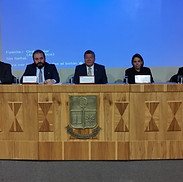

Ecuador moves towards electric mobility
A project for sustainable mobility in Ecuador, with a focus on shifting towards low-carbon electric mobility in transport.
Project Goals

Goal
1
Promote innovation and technology transfer for sustainable energy breakthroughs for low-carbon electric mobility.

Goal
2
Strengthen local government capacities and engage key stakeholders for promoting the up scaling of low-carbon electric mobility.

Goal
3
Work with local and national initiatives, to gradually adopt electric vehicles for their operations.

Goal
4
Inspire key actors to implement regulations and innovative mechanisms to support a just transition to electric mobility.

Goal
5
Take action to implement standards for ensuring the environmental sustainability of electric mobility.
.jpeg)
Goal
6
Mainstream gender equality in the electric mobility sector with the help of pilot projects.
Ecuador moves towards electric mobility
E-MOVILIZA is a transformative project aimed at fostering the transition towards low-carbon electric mobility in Ecuador. With a strong emphasis on gender mainstreaming, the project comprises four components designed to accelerate the adoption of low-carbon electric transportation while ensuring environmental sustainability and social equity.

Component 1: Institutionalization
Demonstrate greater coordination, consultation and capacity on the public sector to promote the expansion of electric mobility in Ecuador.

Component 2: Pilot Project Implementation
Gradual adoption of electric vehicles for last-mile logistics operations by the private sector.
Component 3: Scaling-Up Electric Mobility
Innovative regulations and mechanisms employed by key stakeholders to encourage a just transition to electric mobility.


Component 4: Promoting Environmental Sustainability
Adoption of measures by the national government to implement standards that guarantee the environmental sustainability of electric mobility.

Gender equality: Fostering equality in low-carbon electric mobility
Encourage the inclusion of women and other gender identities in policy-making and actions related to low-carbon electric mobility.
E-MOVILIZA is co-financed by the Global Environment Facility (GEF) implemented by the United Nations Environment Program and executed by the Urban Electric Mobility Initiative (UEMI) for the benefit of the Ministry of Environment, Water and Ecological Transition (MAATE) in articulation with the Ministry of Energy and Mines (MEM) and the Ministry of Transport and Public Works (MTOP).
For the execution of the project, UEMI works in collaboration with the Urban Living Lab Center (ULLC), the National Polytechnic School (EPN) and the Center for Sustainable Mobility (CMS).
The Ministry of the Environment Water and Ecologic Transition in Ecuador ensures the quality and sustainability of natural resources through effective stewardship and inclusive participation. Committed to integrity, responsibility, and service, they strive to lead in ecosystem conservation and promote intercultural respect.

The Ministry of Transport and Public Works, as the governing entity of the National Multimodal Transportation System, formulates, implements and evaluates policies, regulations, plans, programs and projects that guarantee a safe and competitive transportation network, minimizing environmental impact and contributing to the social and economic development of the country.

The Ministry of Energy and Mines promotes the sustainable use of energy and mining resources in Ecuador. It is the governing body that issues public policies that promote optimization, efficiency, transparency, innovation, social and environmental responsibility in the activities of the sector and contributes substantially to the comprehensive development of the country.

United Nations Environment Programme the leading global authority on the environment, inspires nations to enhance quality of life while preserving the future. With over 50 years of experience, they tackle pressing environmental challenges through science, advocacy, and collaboration to achieve sustainable development goals.

The Global Environment Facility is a multilateral family of funds dedicated to confronting biodiversity loss, climate change, and pollution, and supporting land and ocean health. Its financing enables developing countries to address complex challenges and work towards international environmental goals.
The Urban Living Lab Center fosters collaboration on urban climate action projects. It supports joint initiatives and offers a platform for expanding and sustaining efforts. The network of Hubs aims to implement action-oriented urban projects in Asia, Africa, and Latin America, enhancing synergies and reducing duplications.
The Urban Electric Mobility Initiative is a global movement driving the transition to cleaner, more liveable cities through electric transportation solutions. UEMI collaborates with governments, industry, academia, and civil society to co-design solutions, with a focus on empowering women as leaders in urban mobility transformation.
We Drive Change is the UEMI/ULLC initiative driving Equality and Empowerment through Electric Mobility. It advocates for policies that support women, create job opportunities, and provide training in e-mobility. By partnering with governments, universities, NGOs, and the private sector, it aims to build inclusive, sustainable transportation systems that uplift women and advance global climate action.

The National Polytechnical School is the oldest technical university in Ecuador. It is a university community made up of academic staff, students, servers and workers, in search of truth, public law, autonomous, with its own legal status, non-profit. Its main office is in Quito, capital of the Republic of Ecuador, created by Decree of the National Convention of Ecuador, on August 30, 1869. It has the LIAVMS Laboratory for vehicle analysis (gas emissions) and sustainable mobility.

Recognized NGO that seeks to mitigate the effects of climate change and air pollution through the decarbonization of the transportation sector in Latin America and the Caribbean. It has established itself as a technical partner of the main global institutions that promote the decarbonization of the transport sector, as well as regulatory agencies in the region.






